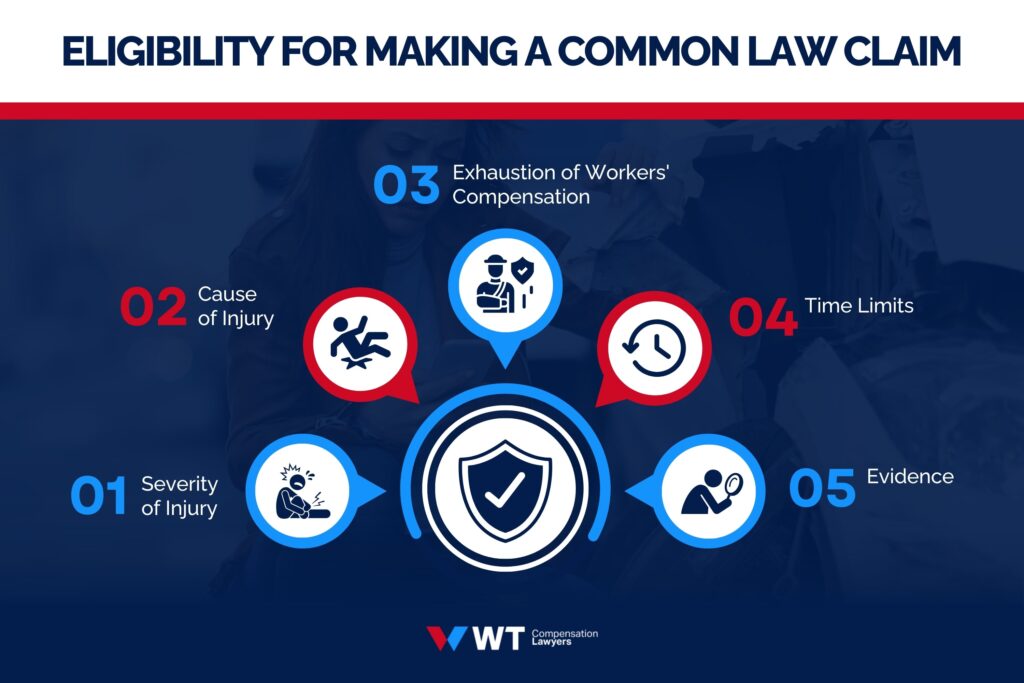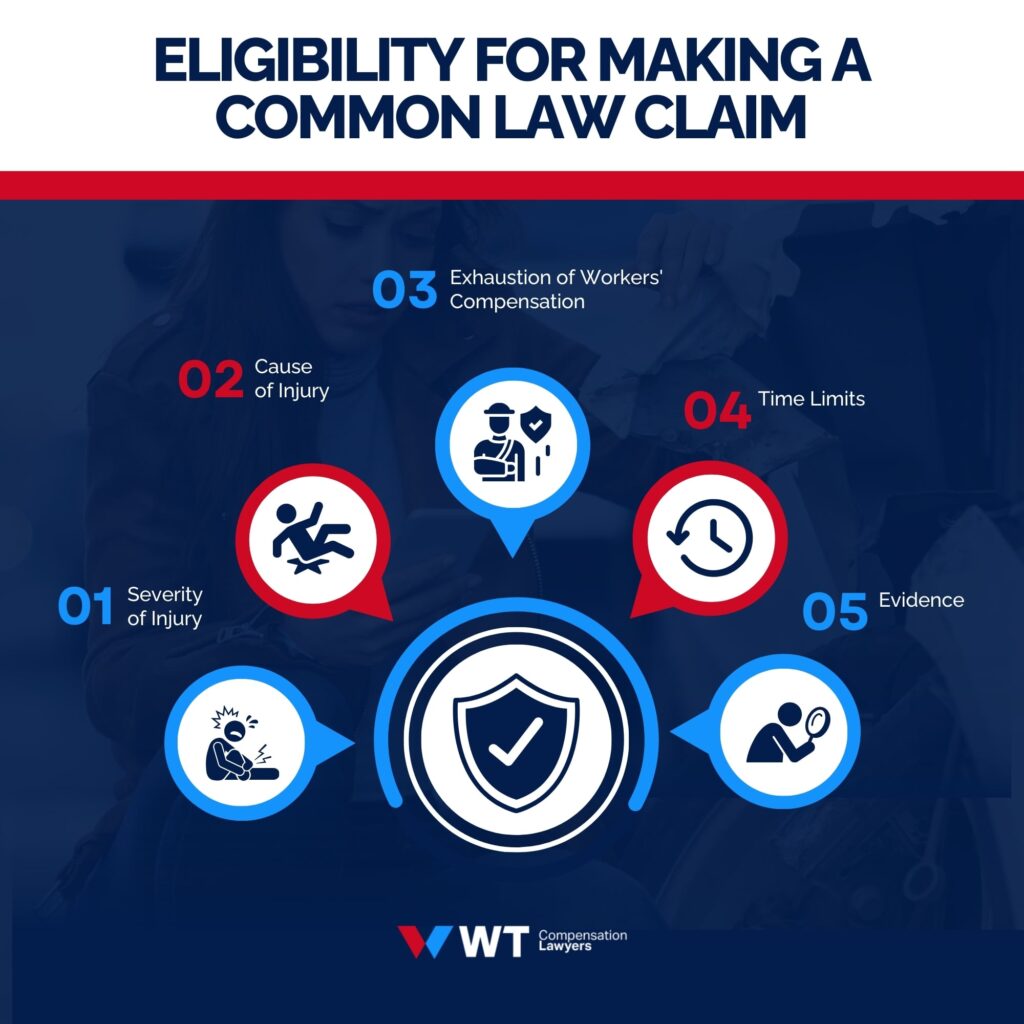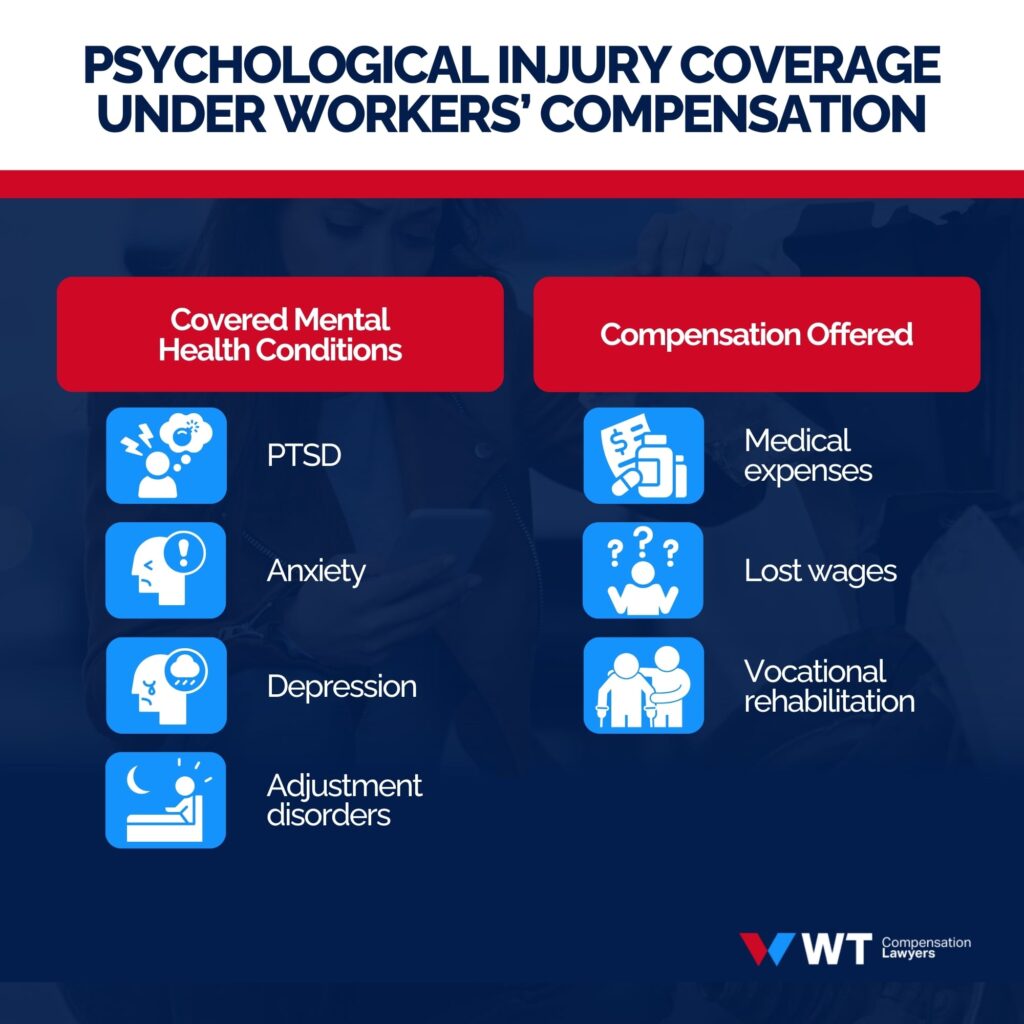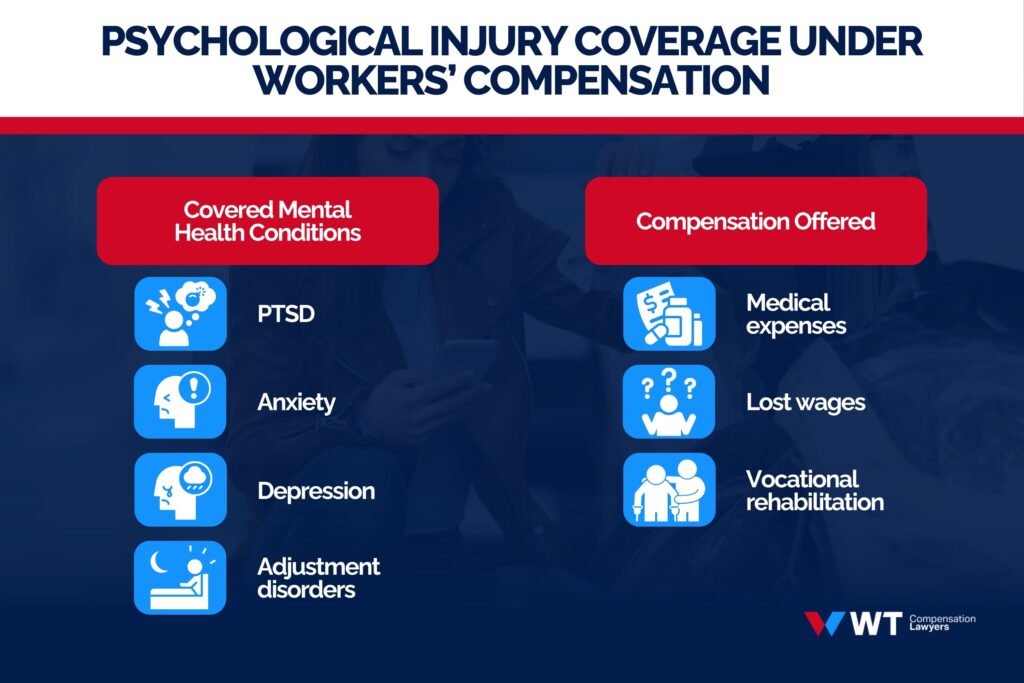Common Law Claims for Psychological Injury
Workplace injuries can be both physically and mentally exhausting. When work-related injuries like these result in psychological harm, it’s very important to understand the legal options available to you for seeking work injury damages. Additionally, you may experience psychological injury in the workplace without any physical damage as a result of bullying or harassment.

At WT Compensation Lawyers, we understand how stressful claiming for a psychological injury can be. However, we’re here to guide you through not just common law claims for a psychological injury, but workers’ compensation, factors affecting compensation payouts, and the process of claiming compensation for psychological injuries in the workplace.
What Is a Common Law Claim for Psychological Injury?
A key factor in common law claims is negligence (aka, fault). You can submit a common law compensation claim for a psychological injury if another party caused your psychological injury. For example, if your injury was caused by the other party being negligent or failing to comply with safety regulations, you can consider filing a common law claim.
This branch of personal injury law lets people hire a personal injury lawyer to sue their employer or someone else if they’ve been hurt emotionally at work. But first, they have to file a claim for benefits without blaming anyone, and they have to get approved for it. Then they can go ahead with their lawsuit.
Eligibility for Making a Common Law Claim


Making a common law claim for psychological injury involves several key eligibility criteria:
1. Severity of Injury
A healthcare professional must assess your injuries and diagnose them as serious and disabling, with a permanent impairment of at least 15% of your entire body. This often leads to diagnoses like PTSD, major depression, or severe anxiety that significantly impact your daily life.
2. Cause of Injury
For common law claims, your injury must be directly caused by the negligence of a third party. This means someone’s actions or mistakes significantly contributed to your psychological harm. For example, workplace bullying, exposure to traumatic events due to your job, or medical malpractice could lead to negligence claims.
3. Exhaustion of Workers’ Compensation
You must have used all the benefits available under your state’s workers’ compensation scheme. This means that you’ve already received all statutory lump sum payments and reached the maximum weekly compensation level.
4. Time Limits
Each state has strict time limits for filing common law claims, usually ranging from 12 to 24 months after the date of injury or receiving your final workers’ compensation payout.
Additional Considerations
- Evidence: It’s important to ensure you have strong medical and psychological evidence supporting your diagnosis, the severity of your psychological injury, and the causal link to the negligent act.
- Legal support: Understanding the complexities of common law claims can be challenging for the general public, so we highly recommend legal support. WT Compensation Lawyers can assist you through the process, gather evidence, and negotiate for a fair outcome.
Average Compensation Payout for Mental Health Claims
The Queensland workers’ compensation scheme statistics 2022–23 report indicates that the average damages cost for common law claims between 2022 and 2023 was $188,794.00
Notably, Queensland’s laws allow for two types of workers’ compensation claims:
- statutory claims (no-fault claims)
- common law claims (someone else was negligent)
Using data collected from WorkSafe’s Key work health and safety statistics Queensland 2022 and the Office of Industrial Relations’ Queensland workers’ compensation scheme statistics 2022–23, we’ve summarised the payouts for psychological injuries and mental health claims below:
| Year | Average Statutory Claim Payout (Psychological Injuries) | Average Common Law Claim Payout (Settlement) | Total Number of Common Law Claims |
|---|---|---|---|
| 2019–20 | $37,418 | $168,293 | 3,004 |
| 2020–21 | $55,402 | $172,524 | 3,237 |
| 2021–22 | $61, 047 | $176,138 | 3,275 |
| 2022–23 | $68,136 | $188,794 | 3,503 |
These figures suggest that employees are filing compensation claims more frequently, but it’s more likely that lawyers have filed and won more claims on behalf of their clients.
Moreover, mental health conditions represent a modest yet growing segment of serious compensation claims, escalating from 3% of all serious claims in the 2014–15 period to 5% in 2020–21 (preliminary data).
| Metric | Data |
|---|---|
| Mental health claims (% of total serious claims, 2020–21) | 5% |
| Major categories of mental health claims (2020–21) | – Anxiety/stress (53%) – PTSD (22%) |
| Median time lost for mental health (2015–16) | 16.2 working weeks |
| Median time lost for mental health (2019–20) | 24 working weeks |
| Total serious claims for mental health conditions (2020–21) | 1,759 |
| Total psychological and psychiatric injuries claims (2021–22) | 5,530 |
| Total psychological and psychiatric injuries claims (2022–23) | 6,318 |
How Does Workers’ Compensation Work for Psychological Injuries?
Workers’ compensation is a system designed to provide compensation benefits to employees who suffer work-related injuries, including psychiatric injuries. The Workers’ Compensation Act offers employees financial amends as lump sum compensation and medical assistance to those who have been injured at work.
Psychological Injury Coverage Under Workers’ Compensation
Workplace injuries aren’t always physical wounds like broken bones and sprains. The emotional damage of a demanding job, exposure to traumatic events, or persistent harassment can have long-lasting psychological scars. Thankfully, in many countries, workers’ compensation programmes recognise mental health injuries and their effects.
The specific coverage for psychological injuries depends on your jurisdiction, but generally, compensation is available if the injury:
- Arose out of and in the course of employment: This means the injury was directly caused by your work duties or work environment.
- Is a significant contributing factor: While pre-existing conditions or personal stressors might play a role, for a successful claim, the work-related factor must be a major contributor to the injury.
- Is diagnosed by a qualified professional: A medical or psychological evaluation is crucial to establish the nature and severity of the injury.
Coverage can include various mental health conditions, such as:
- Post-traumatic stress disorder (PTSD) is often experienced by first responders or people witnessing workplace violence.
- Anxiety and depression are frequently triggered by chronic work stress, bullying, or harassment.
- Adjustment disorders, which can develop due to significant changes in job duties or workplace dynamics.
The type of compensation offered can include:
- Medical expenses: Therapy sessions, medication, and other treatment costs
- Lost wages: Income lost due to missed work or reduced capacity
Vocational rehabilitation: Support for retraining or job changes if the injury limits your ability to perform your previous duties.
In most places, you can get help if your job makes you feel too stressed and you need to apply work stress leave.


Even if at fault, you may have a right to compensation. Start your claims check:
🔒 FREE CLAIMS CHECK TAKES 2 MINUTES
Steps to File a Workers’ Compensation Claim for Psychological Injury
Filing a workers’ compensation claim for psychological injury involves reporting the injury to the employer, seeking medical treatment, and filing the claim with the relevant workers’ compensation authority. An experienced injury lawyer can guide you through the workers’ compensation claim process and ensure you get the rightful work injury damages claim for your psychological injuries.
Get Assistance to Lodge a Workers’ Compensation Claim
A lawyer can determine if you may be entitled to workers’ compensation. Here’s how you can get assistance:
- Reach out to legal aid: Many organisations offer injured workers free or discounted legal assistance. Check with your local bar association, union, or community legal aid centre.
- Consult a workers’ comp lawyer: Look for lawyers who focus exclusively on workers’ compensation cases. Their expertise can make a world of difference in navigating the specific laws and regulations of your state.
- Schedule a free consultation: Most lawyers offer a free initial consultation to discuss your case. This is a chance to ask questions, get an honest assessment of your situation, and see if the lawyer is a good fit for you.
Remember, taking the first step is about empowering yourself. A lawyer can help you understand your rights and ensure you receive the benefits you deserve. They’ll handle the legal complexities while you focus on healing. Don’t let paperwork and confusion stand in the way of getting the support you need; contact WT Compensation Lawyers today.
Compensation Payouts for Psychological Injury
Psychological injuries can be just as debilitating as physical injuries, and they can have a significant impact on your life. Just like having hearing loss and hurting your shoulder. If you’ve suffered a psychological injury due to someone else’s negligence, you may be entitled to compensation.
What Are the Different Types of Compensation?
There are two main types of compensation for psychological injury:
- Economic damages: This type of compensation covers the financial losses you’ve suffered as a result of your injury. Your compensation would include lost wages, medical expenses, and future lost earnings.
- Non-economic damages: This type of compensation covers the pain and suffering you’ve experienced because of your injury.
If you need help understanding or getting these compensations, you might want to talk to workcover lawyers. They specialize in helping people with injuries at work.
How Is the Amount of Compensation Calculated?
The amount of compensation you receive will depend on various factors, including:
- The severity of your injury
- The impact of the injury on your life
- The amount of evidence you have to support your claim
Consulting with WT Compensation Lawyers for Advice
Here at WT Compensation Lawyers, we know how much a psychological injury can change your life. Not only is it painful emotionally, but it also affects your work, relationships, and overall well-being. That’s why we’re here to give you a helping hand and the right advice for getting through the complexities of seeking compensation for your suffering.
We believe in a client-centred approach, where your needs and concerns are always at the forefront. Our team of dedicated lawyers and support staff will take the time to listen to your story, understand your unique situation, and answer any questions you may have.
Remember, you’re not alone in this. At WT Compensation Lawyers, we’ll fight for your rights and ensure you receive the compensation you deserve. So, if you’re suffering from a psychological injury caused by someone else’s negligence, don’t hesitate to contact us. We’ll be your advocates, allies, and unwavering support system throughout the process.
Contact us today for a free consultation, and let us help you take the first step towards healing and justice.
Common Law Claims Psychological Injury FAQs
According to a 2020 report by the Australian Safety and Compensation Commission (ASCC), psychological injuries accounted for 78% of all serious claims lodged under the national workers’ compensation scheme. This highlights the growing number of psychological injuries in the workplace and the importance of understanding the compensation process.
You should consider making a common law claim for psychological injury if your injury is serious and debilitating, caused by someone else’s negligence, and not fully compensated by workers’ compensation. This means you would need to meet a higher threshold of injury, often diagnosed as conditions like PTSD, anxiety, or depression. You will also need to prove that the negligent act (e.g., workplace bullying or harassment) significantly contributed to your injury.
What our clients say
Even if at fault, you may have a right to compensation. Start your claims check:
???? FREE CLAIMS CHECK TAKES 2 MINUTES
Back to Top: Common Law Claims for Psychological Injury


Reviews
Ru McKinnon
Jono, Sinny and everyone at WT Compensation Lawyers are the best car accident lawyers in Brisbane I’ve come across. The genuine care, compassion and human kindness they show to their clients is clear from the very first moment you speak to them. I cannot recommend them enough to anyone in need of a personal injury lawyer and would not hesitate at all to refer any of my family or friends. Thank you guys always for all your great work.
Colin Lee
I highly recommend Jono, Sinau and the entire team at WT as personal injury lawyers for anyone in Brisbane looking for the best representation. Jono is a step above other lawyers, both in knowing his craft but also in the way he treats his clients like one of his own family. From the very first moment I met him, he has treated me with respect, kindness and compassion and I am glad to say we have become good friends. WT are genuine and very good people who want nothing more than to do the best thing by their clients so THANK YOU for all that you do.
Laurence Twining
Life changing. Seriously. I would highly recommend Jono without any hesitation to anyone in Brisbane looking for the best car accident lawyer. The word grateful doesn’t even begin to express how I feel after having Jono look after me after my car accident claim. He has single handedly changed my life and has given me an opportunity to move on with a bright future after some of the toughest times after my accident. I previously used a big personal injury firm, one that has ads on tv and big marketing budgets for an old work accident and the experience isn’t comparable at all. Care, empathy, compassion, kindness and always had time for me, no matter what time of day/night or how silly my question was. Jono always made me feel like I was important and always kept me updated with everything that was going on. I only wish I had used WT for my old work accident. My result I got far exceeded my expectations and is only a testament to the great personal injury lawyer that Jono is. If you’re still looking for a car accident lawyer just seriously stop and give Jono a call. You will not regret it.
RD
I can’t thank Jono enough for his outstanding work after my motorcycle accident. His dedication, expertise, and genuine care made all the difference in my case and surprisingly turned a horrific situation into a positive one for me. From day one, he took the time to understand my situation, became a very real pillar of support for me, and kept me informed every step of the way. Jono’s strategic approach and relentless advocacy got me a life changing outcome beyond my expectations. If you’re searching for the best personal injury lawyer in Brisbane who truly goes above and beyond, Jono is your go-to guy. He’s also a great bloke which I’m sure is clear to everyone who has the pleasure of crossing paths with him. I’m so grateful for his expertise, support and friendship and writing this review is just a very small way of me thanking him for changing my life.
Tania Harimate
Sinau and the team at WT Compensation Lawyers have been nothing short of amazing. From the beginning, they made me feel comfortable with the process and were so easy to contact. Sinau was very professional and always calling me to keep me updated with my claim. He would always go out of his way to make sure my family and I were okay which I am really grateful for. His kind words and professional advice during a dark time in my life was the glimmer of hope that I needed to keep going. I will always be recommending Sinau and the team at WT to my friends and family, as I truly believe they are the best WorkCover lawyers in Brisbane. From the bottom of my heart, thank you for looking out for your Pasifika people Sinau. It is rare that we see people like you who genuinely care for our community and for that I thank you.